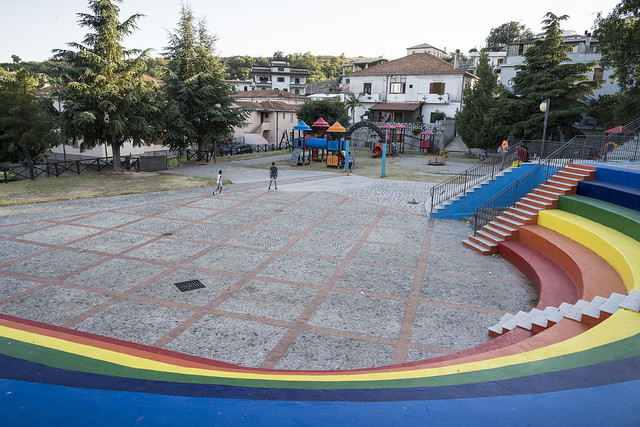Riace, the "utopia of normality" in the heart of Calabria
- In the town of Riace, in the region of Calabria, the entrepreneurs of the caravan Ampliacion Fronteras ended their journey in Italy. On the 21st of last Saturday, they approached this town to learn about the experiences of reception that the locals use.
At the entrance of Riace, after a paved road, a sign with the colors of the rainbow gives discomfort to the attendees in seven languages. Below this, another poster presents the 20 nationalities of those who live in the village. Riace is known for his policies of welcoming migrant people in the last twenty years and immersing them in the daily life of the people. According to the local mayor, Domenico Lucano, the experience began in 1998, coincidentally, with the arrival of a ship of 200 refugees from Iraqi and Turkish Kurdistan: "We took those because this country has that sensitivity."
Diverse nationalities are present in the village of Riace, where they are all uncomfortable #AbriendoFronteras #CaravanaAbriendoFronteras @HirukaEus #nonUnadiMeno @Hodei_Torres #riace pic.twitter.com/42DOrgPxO9
— Iker Rincon (@irincon_) July 20, 2018
Currently, there are about 1,800 people of 20 nationalities living in this town of Calabria. Thanks to the migrants and refugees who have arrived, they have managed to revive the local economy and revitalize the town; however, as the mayor acknowledged, the situation they have experienced in recent years is not the same as before and the project can be compromised at one time or another due to financial problems. The right-wing government of Italy has opposed this type of project and regrets the fact that the subsidies are getting smaller and smaller, Councilman Gianmichele Bosco, representative of the popular candidacy Cambiavento, in Catanzaro, the capital of Calabria. "We've been having some serious self-management issues lately. They are opposed to any project to help migrants," Bosco complains. Lucano concludes that the only solution to being self-sufficient in the "racist" system they live in is to get out of the system. For this reason, in Riac they use the local currency to allow the project to go crazy.
Mimmo Lucano explains the reception policy that Riace has implemented to the people of the Caravan Expanding the Borders in the amphitheater of the town The mayor of Riace has given everyone a discomfort in #delimiting #AbriendoFronteras #CaravanaAbriendoFronteras @HirukaEus #nonUnadiMeno @Hodei_Torres #riace pic.twitter.com/wPJCIxlFLT
— Iker Rincon (@irincon_) July 20, 2018
A different model of reception
Leaving Riace behind, they have used the homes of those who left to welcome people from outside Italy and help them in their search for a better life. “We have created hope, not just for Riace, but for humanity,” Lucano said. The year after receiving refugees from Kurdistan in 1998, Lucano made a request to include Riace in the Italian National Asylum Program. This system provides grants for projects that receive asylum seekers. "I was the first to say that the reception centers should not be closed places; the doors should always be open for places of this type," said the mayor. Thus, after accepting this request, thanks to grants from the Italian Government and the European Union, Riace was revitalized and 400 people from all over the world can now be seen on its streets: From Palestine, Kurdistan, Syria, Ethiopia, Somalia...
The Italian Government itself sends migrants to Riace to participate in the local reception project. In it, they initiate the process of obtaining the necessary legal documents. However, as those responsible acknowledged, this path is not usually short. In the meantime, migrants can live freely in this municipality, participating in the daily life of the town, unlike other centres. "Here all migrants are considered as people from the very beginning," said Bosco.
Intervention of the Mafia
In Calabria you can find other projects for reception, but not like those of Riac. The Councilor of Catanzaro explains that Lucano has taken a step further with the project and turned it into a political struggle: "Riace is special, he's unique in his model. There are several other villages in the area that welcome you, but not here legally. Riace’s model was born 20 years ago and since then, in addition to welcoming, it also offers migrants the possibility of social integration.”
The neighbouring host populations receive migrants and are subsidized by the Government for this purpose. However, these projects are only based on this, on simple reception. In addition, Bosco regrets that the local mafia has begun to take advantage of this situation. Often, those who receive are from the mafia, and they are the ones who are left with the money. In others, they also take advantage of migrant workers who have been taken to work on abusive journeys: "They pay them one euro per hour to make them need it illegally."
The reception project of Riace is currently compromised due to economic problems. When the project was launched, it was very well received, among neighbors and migrant and refugee people. "It was a utopia of reception and coexistence", in the verbs of the neighbors. However, problems began several years ago, when the Government launched investigations into Lucano and the project he had undertaken, in order to discredit him. Lucano was accused by the government of having made mistakes in the public administration, but the investigations concluded that everything was fine. However, a year ago the Government began to reduce the two subsidies and, as the local economy has not developed much, Riace is about to run out of resources, jeopardizing the future of the project.
"The Utopia of Normality"
Almost half of the population of Riace is made up of people from abroad. In addition to receiving them in the village, they have the opportunity to integrate with the remaining citizens and live in a "normal" way. It is common to watch football matches in the park while the elderly play cards on the adjoining terrace. Others, in the meantime, also have the opportunity to participate in various local projects, such as workshops, shops and orthotics. In the same way, they have full freedom to go to neighboring towns. However, several migrants complain that this freedom has a "limit": "there are few buses for mobility, the subsidies they give us are not enough and there are no jobs".
The work of volunteers, necessary
A woman named Daniella bought a house in Riac a long time ago to make this building a cultural center. It hosts several volunteers during the summer to develop projects for the local population, both migrants and natives. These days there are three young people in need: Fabia, Antonella and Aldo. They will spend the summer months there to take care of the children, provide out-of-school and help in general. According to the explanations given, some activities for women were recently developed and some murals have been made in the village. “We work to integrate people and often use culture and art for this task,” the volunteers explained, “we unite African and Italian cultures so that this integration can be done in the best possible way.”
Photo gallery (Hodei Torres)

This article has been published by Triuka and we have brought it to LUZ thanks to the CC-by-sa license.
















